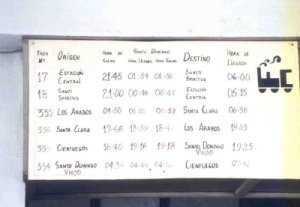
|
Estación de Santo Domingo Nuevo
Salida de los trenes.
Bahnhof Santo Domingo Nuevo
Abfahrt der Züge.
Santo Domingo Nuevo Station
Departure of Trains.
|
Estación de Cienfuegos
Informaciones ferroviarios y no ferroviarios.
Bahnhof Cienfuegos
Eisenbahn und andere Informationen.
Cienfuegos Station
Information about Railway and other interests.
|
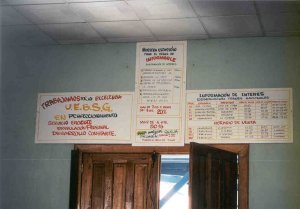
|
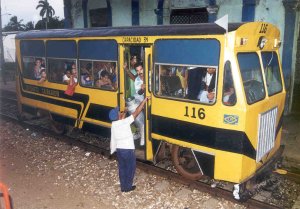
|
Coche Motor no. 116, Servicio de pasajeros
de MINAZ desde Caibarien; Capacidad 39 Pasajeros o Jarros de Leche o de cada
unos?
Triebwagen Nummer 116, MINAZ Personenverkehr ab Caibarien; Kapazität
39; Passagiere oder Milchkannen oder je 39?
Railcar 116, MINAZ Passenger service out of Caibarien; Capacity 39; Passengers
or milk-cans or of each ones?
|
Coche-motor 2414, un Finlandés
en su primera vida al lado de coches de alemaña oriental en estación
de Santa Clara. Estos coches corren desde Habana a Morón o Camagüey
Triebwagen 2414, in seinem ersten Leben ein Finne, neben ex-DDR Schnellzugwagen
im Bahnhof Santa Clara. Diese Triebwagen verkehren von Habana nach Morón
oder Camagüey.
Railcar 2414, in its first live a Finnish vehicle side by side with ex-East
German coaches at Santa Clara station. These Railcars
run from Habana to Morón or Camagüey.
|
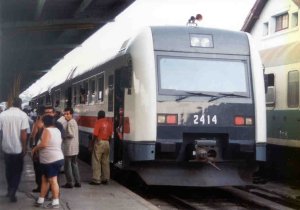
|
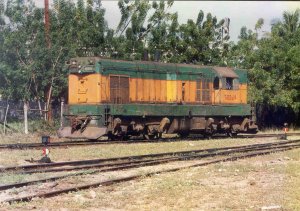
|
Locomotora 50924 esperando su próximo
servicio en una sestación del oriente de la red.
Lokomotive 50924 wartet auf ihren nächsten Einsatz im einem Bahnhof
im Osten des Staatsbahnnetzes.
Locomotive 50924 awaiting its next duty in a station of the Eastern part
of the network.
|
CAI Marcelo Salado, locomotora 39022,
la más potenta de MINAZ con un coche turistico del tipo Jardinera
y un caboose.
CAI Marcelo Salado mit Lokomotive 39022, der kräftigsten on MINAZ mit
einem offenen Turistenwagen und einem Begleitwagen.
CAI Marcelo Salado with Locomotive 39022 the most powerful of MINAZ, with
an open-air tourist coach and a caboose
|
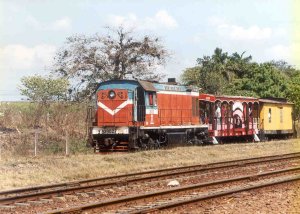
|
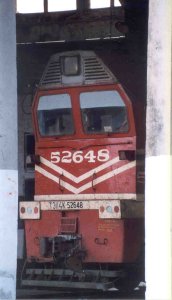
|
Camagüey Talleres, locomotora 52648
una TE114K de origén soviética.
Camagüey Depot, Lokomotive 52648, eine TE114K sowietischer Herkunft.
Camagüey shops, locomotive 52648, a TE114K of Soviet origin.
|
Camagüey Talleres, una TE114K (la
52642) pasando reformas.
Camagüey Depot, eine TE114K (die 52642) wird Reparaturen unterzogen.
Camaguey Shops, a TE114K (nr. 52642) is about to be repaired.
|
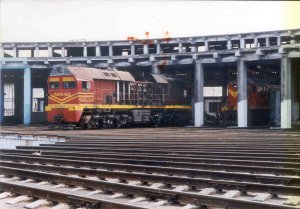
|
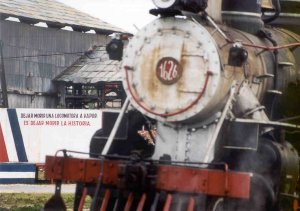
|
La placa al fondo dice: "Dejar morir
una locomotora a vapor, es dejar morir la historia"; vale siempre en Cuba?
Das Schild im Hintergrund sagt: "Eine Dampflok sterben lassen, heisst die
Geschichte sterben lassen"; gilt das nur in Kuba?
The Text in the background says: "Let die a steam loco will say let die
history"; is this valid in Cuba only?
|
Bienvenidos a Rafael Freyre.
Willkommen in Rafael Freyre.
Welcome at Rafael Freyre.
|
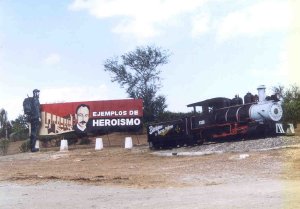
|
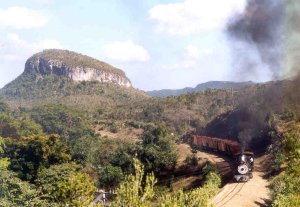
|
Tren de cana de azúcar Línea
Rafael Freyre.
Zuckerrohrzug der Rafael Freyre Bahn.
Cane train on the Rafael Freyre system.
|
Estación de San Luis, Tren de
pasajeros con locomotora 71012 y coches Taino (de hecho Cubano), a la derecha
se encuentra El Tren de Auxilio, estacionado para los casos de accidentes
en el área Santiago/Guantánamo/ Bayamo.
Bahnhof San Luis, Personenzug mit kubanischen Wagen des Typs Taino hinter
Lokomotive 71012, rechts davon der hier stationierte Hilfszug, welcher im
Falle von Zwischenfällen im Raum Santiago/Guatánamo/Bayamo zum
Einsatz kommt.
San Luis Station with passenger train formed of Cuban made Taino coaches
behind Loco 71012, at right "Auxiliary Train" which is always here and used
in the case of any accident in the Santiago/Guatánamo/ Bayamo area.
|
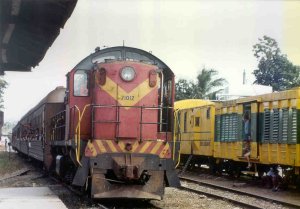
|
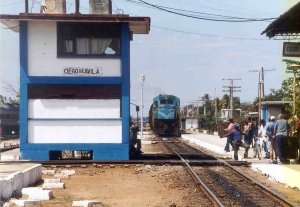
|
Ciego de Avila, la cabina arregla las
circulaciones de los trenes en las dos líneas UFC qué se crucen
a nível. Un tren exprés de carga con locomotora mexicana llega
a la estación.
Ciego de Avila, das Stellwerk regelt den Verkehr auf den beiden UFC Strecken,
die sich im rechten Winkel kreuzen. Ein Express Güterzug mit mexikanischer
Lok erreicht soeben den Bahnhof.
Ciego de Avila, the cabin regulates circulation on the two UFC lines which
are crossing each other on grade. An Express freight train with a Mexican
locomotive reaches the station.
|
Ramal de Holguin: Un tren local de Santiago,
Las Tunas, Antilla o Guantánamo con coches de alemañia oriental
antes de su llegada al destino Holguin.
Zweigstrecke von Holguin: ein Lokalzug aus Santiago, Las Tunas, Antilla
oder Guantánamo, aus ex-DDR Wagen gebildet, kurz vor erreichen von
Holguin.
Holguin branch: A local train from Santiago, Las Tunas, Antilla or Guantánamo,
built up of former east German coaches, shortly before arriving at its destination
Holguin.
|
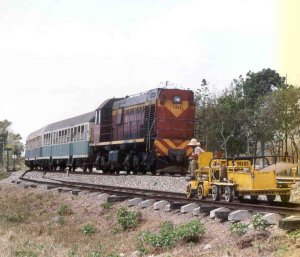
|
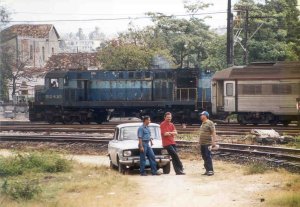
|
Santiago de Cuba, playa de la estación
vieja, destino del Trens Francés número 1, compuesto por la
locomotora canadiense MLW 52410 y coches franceses.
Santiago de Cuba, Gleisfeld des alten Bahnhofes, Ziel des "Tren Francés"
Nummer 1, zusammengesetzt aus der kanadischen Lok MLW 52410 und französischen
Wagen.
Santiago de Cuba, yard of the old station, destination of "Tren Francés"
nr. 1, built-up of the Canadian MLW locomotive 52410 and French coaches.
|